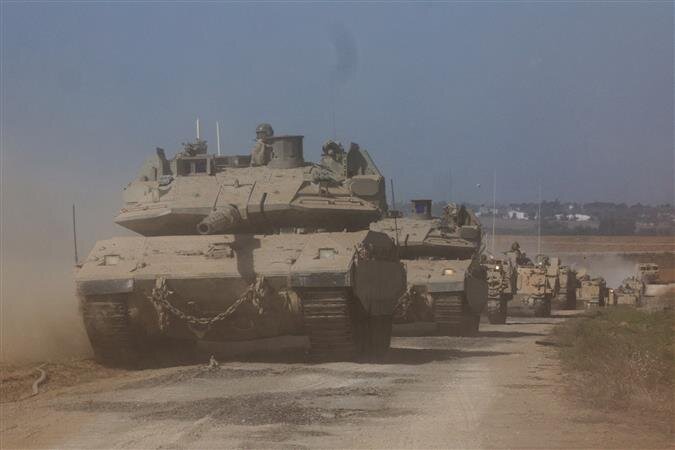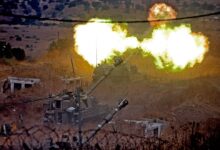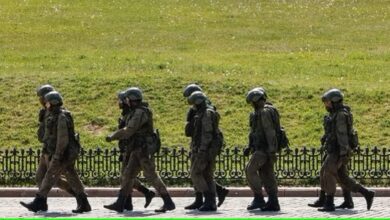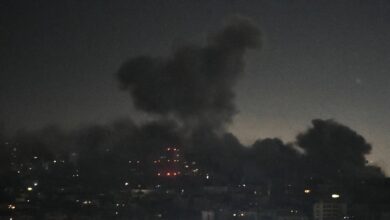Gaza Border Crossing Readies For Reopening As Israeli Troops Gear Up For Ground Assault

- According to the Palestinian Red Crescent Society, Israel told the hospital on Saturday to leave, but it can't move sick and hurt people out of the building.
- The number of people seeking shelter in our schools and other UNRWA facilities in the south is absolutely overwhelming
An Egyptian-run border crossing into Gaza is set to reopen as international efforts are made to get aid into the Hamas-run area that has been heavily bombed by Israel since the group’s attack on October 7 that killed 1,300 people.
Israel is shocked by the attacks on towns and villages, so they are bombarding Gaza with more bombs than it has ever seen, putting up a strict blockade, and getting ready for a ground invasion.
A deal must be reached for hundreds of metric tons of aid from several countries to be safely sent to Gaza, and some foreign visa holders must be evacuated through the Rafah crossing. The aid has been stuck in Egypt’s Sinai Peninsula for days.
“Rafah will be open again.” “We’re setting up a way to get the help in and to the people who need it with the help of the UN, Egypt, Israel, and others,” U.S. Secretary of State Antony Blinken said after meeting with Egyptian President Abdel Fattah al-Sisi on Sunday.
Blinken didn’t say exactly when the crossing would be open again. Veteran U.S. diplomat David Satterfield was named a special envoy for humanitarian problems in the Middle East on Sunday. He will go to Egypt on Monday to work out the details, Blinken said.
The Rafah border gate was said to open at 9 a.m. on Monday by a Palestinian official. According to a security source, ABC News said the crossing would be open for a few hours on Monday, but they didn’t say more. Reuters could not confirm either story right away.
Israel has told tired Gazans to leave for the south, and hundreds of thousands have already done so. More than two million people live in the surrounded area. The government in Gaza, Hamas, has told people not to pay attention to Israel’s message.
The UN’s humanitarian office (OCHA) said on Monday that hospitals in the Gaza Strip will only have enough fuel to last for another 24 hours. This means that thousands of patients are in danger.
At least 2,670 people have been killed so far by Israel’s retaliatory strikes, with almost 10,000 others hurt. About a fifth of those killed were children. Another 1,000 people were missing and thought to be buried under the rubble.
Officials from the U.S. government say they are getting ready for a brutal ground offensive to help ease the humanitarian situation in Gaza.
In reaction to the Hamas attacks, President Joe Biden has told Israel to follow the rules of war. On Sunday, he wrote on social media that “the overwhelming majority of Palestinians had nothing to do with Hamas’ appalling attacks and are suffering as a result of them.”
Washington also wants to keep the conflict from spreading, especially since fighting with Lebanon is getting worse near Israel’s border.
He said that the leaders of the Arab states he had been to recently were eager to keep the war from spreading.
“They are using their own power and connections to try to stop this from happening,” Blinken said. He was supposed to be back in Israel on Monday and is also trying to get the release of 155 hostages, including Americans, that Israel says Hamas took back into Gaza.
Iran, which backs both Hamas and Hezbollah, told Israel that things would get worse if they kept striking Palestinians.
Foreign Minister Hossein Amirabdollahian said, “If the Zionist aggressions do not stop, the hands of all parties in the region are on the trigger.” He also said that Tehran could not just watch.
EXPECTED TO BE GROUND OFFENSIVE
In a show of unity, Prime Minister Benjamin Netanyahu called together Israel’s expanded emergency cabinet on Sunday. The government includes former opposition lawmakers. “Hamas thought we would be destroy.” “We are going to destroy Hamas,” he said.
Graphic videos of the attacks and accounts from medical and emergency services in the towns and kibbutzes that were attacked made Israelis feel even more shocked.
Thirty Americans were killed in the bombings, and thirteen are still missing, according to the State Department. France said that 19 of its own people had died and 13 were missing. Canada added five more deaths to its list.
In response, Israel’s military says it is going after Hamas and its infrastructure. Tanks have been gathered on the border with Gaza to get ready for a ground attack.
The military said that on Sunday, Israeli planes hit about 250 military targets and killed the leader of Hamas’ southern district.
Lieutenant General Herzi Halevi, the head of the Israeli military, told soldiers near the border with Gaza that they would be going into the area to get rid of Hamas and target “every place, every commander, and every operator.”
“You are about to do something big and important, that needs to change the situation for a long time in a clear way,” Halevi stated.
THE HUMANITARIAN CRISIS
Fuel, food, and water have not been able to get into Gaza because of an Israeli blockade. However, a minister said on Sunday that Netanyahu and Biden had decided to restore water to parts of southern Gaza.
The Israeli military said that about 600,000 Gazans had left the northern half of the area. This includes the more than one million people who live in Gaza City.
When some Palestinians went south, they said they were going back north because they were being attacked everywhere they went.
Early Monday morning, Israeli planes bombed areas around Gaza City’s Al-Quds hospital. According to Palestinian media, the strikes have stopped vehicles at the hospital from moving.
According to the Palestinian Red Crescent Society, Israel told the hospital on Saturday to leave, but it can’t move sick and hurt people out of the building.
“On the verge of collapse,” said Philippe Lazzarini, commissioner general of UNRWA, the UN organization for Palestinians. Helping efforts in Gaza were also in danger.
“The number of people seeking shelter in our schools and other UNRWA facilities in the south is absolutely overwhelming, and we do not have any more the capacity to deal with them,” he stated.






Facebook Comments